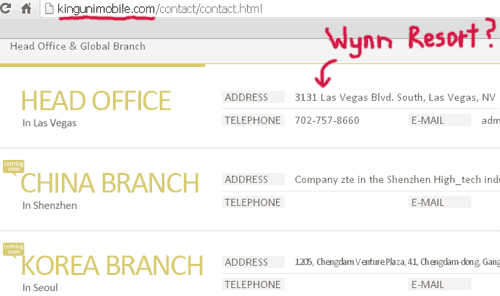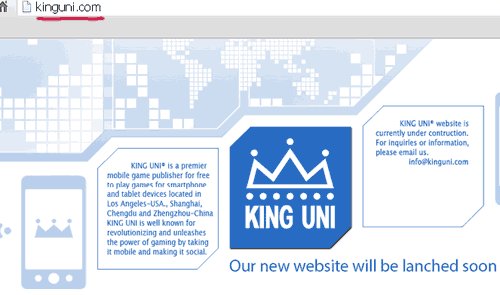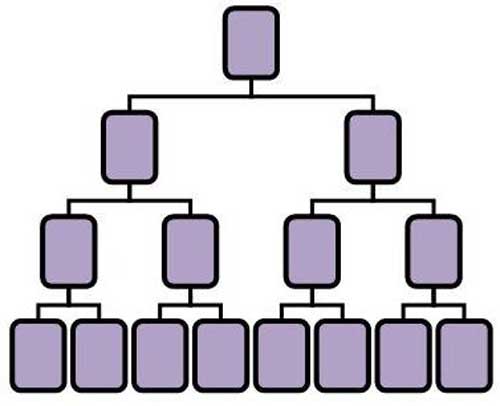KingUni Review: $100 to $1999 mobile gaming?

There is no information on the KingUni website indicating who owns or runs the business, with the company only disclosing that it’s a
joint-venture with investors from China, South Korea, and the United States.
A corporate address is provided on the KingUni website, indicating that the company is registered in the US state of Nevada.
Interestingly enough the address provided (“3131 Las Vegas Blvd. South, Las Vegas, NV”), is that of the Wynn Las Vegas and Encore Hotel. No mention of KingUni is made anywhere on the Wynn Resort website, nor do they list any leasable office space (virtual or otherwise), so why KingUni are using their address on their website is a mystery.
Two additional corporate addresses are provided on the KingUni website, one in Shenzen China and the other Seoul Korea.

Both addresses however are marked “coming soon”.
The KingUni website domain (“kingunimobile.com”) was registered on the 23rd of August 2013, and lists a “Lee Jong Jin” as the domain owner.
I wasn’t able to find any further information on Lee Jong Jin, other than he or she appears to be based out Korea. The email address used to register the KingUni Mobile domain is a Korean-language domain, with the KingUni Mobile website itself being hosted out of Korea.
With the information that is currently known, Lee Jong Jin’s relationship and/or position within KingUni is unclear.
As always, if an MLM company is not openly upfront about who is running or owns it, think long and hard about joining and/or handing over any money.
The KingUni Product Line
According to the KingUni website, the company plans
to become a leading company in Mobile Gaming Development and Management, to reach a total company value of over 10 billion USD within 3-5 years, release 50-80 games for Mobile Devices (and) achieve over 1.5 million USD monthly revenue by Q4.
As it stands now however KingUni don’t appear to have a tangible product. Their mobile gaming platform is assumedly going to be over at “kinguni.com”, a domain registered on the 23rd of April 2013 with anonymous registration.

The KingUni website advises that it is “currently under construction” but that when complete will be a
premier mobile game publisher for free to play games for smartphone and tablet devices located in Los Angeles – USA, Shanghai, Chengdu and ZhengZhou – China.
Despite having not even launched their mobile game platform yet, KingUni also claims to be
well known for revolutionizing and unleashes (sic) the power of gaming by taking it mobile and making it social.
How KingUni plans to “revolutionize” mobile gaming is not disclosed.
The KingUni Compensation Plan
With no tangible product the KingUni compensation plan instead revolves around the sale of affiliate memberships:
- K – $100
- K1 – $599
- K2 – $1199
- K3 – $1999
Recruitment Commissions
When a new KingUni affiliate joins the company and pays their membership fees, the affiliate who recruited them earns a commission. How much of a commission is earnt depends on how much the newly recruited affiliate pays for membership:
- K – $10
- K1 – $60
- K2 – $120
- K3 – $200
Binary Commissions
Residual commissions in KingUni are paid out using a binary compensation structure. A binary compensation structure places an affiliate at the top of a binary team, with two positions directly under them.

In turn, these two positions branch out into another two positions and so on and so forth down a theoretical infinite number of levels.
Each of these positions represents a KingUni affiliate, either recruited directly or via the efforts of an affiliate’s up and downlines.
Affiliates are paid a commission per affiliate in their binary team, with how much is paid out determined by the membership fees paid by recruited affiliates:
- K – no commission paid out
- K1 – $10
- K2 – $20
- K3 – $30
How many binary levels a KingUni affiliate is paid out on is determined by how much they pay in affiliate fees:
- K – no residual binary commissions paid out
- K1 – 5 levels
- K2 – 8 levels
- K3 – 10 levels
Lucky Prize
KingUni offers K1, K2 and K3 affiliates what they call a “lucky prize”. This basically equates to yet another recruitment commission, paying out $1 on K1, $2 on K2 and $3 on K3 affiliates.
How many affiliates a KingUni affiliate can earn on again depends on how much they pay in membership fees:
- K1 – 50 affiliates
- K2 – 75 affiliates
- K3 – 100 affiliates
Leadership Award
KingUni’s Leadership Award pays out affiliates who have recruited at least three K3 affiliates.
Once the above qualification criteria is met, KingUni affiliates are then paid out $100 for a recruited K1 affiliate, $200 for a K2 and $300 for a K3.
The Leadership Award is paid out using a unilevel style compensation structure, paying out down a theoretically infinite number of levels.
Profit Sharing
KingUni take an unspecified percentage of affiliate membership fees paid each day and pay the money out to K1 and above ranked affiliates.
How many days of the week and how much an affiliate is able to earn via KingUni’s profit sharing is determined by their affiliate membership rank:
- K1 (pay $599) – paid on Mondays, weekly cap of $40 up to a total of $1000
- K2 (pay $1199) – paid on Tuesdays, weekly cap of $80 up to a total of $2000
- K3 (pay $1999) – paid on Wednesdays, weekly cap of $160 up to a total of $5000
- Ruby (personally recruit 3 K3 ranked affiliates) – paid on Thursdays, weekly cap of $200 up to a total of $10,000
- Sapphire (personally recruit 3 Ruby ranked affiliates) – paid on Fridays, weekly cap of $600 up to a total of $100,000
- Emerald (personally recruit 3 Sapphire ranked affiliates) – paid on Saturdays, weekly cap of $2000 up to a total of $500,000
- Diamond (personally recruit 3 Emerald ranked affiliates) – paid on Sundays, weekly cap of $5000 up to a total of $1,000,000
Although not explicitly clarified in the WCM777 compensation plan material, I believe the higher ranks are paid retroactively on the previous days of the week for lower ranks.
Ie. a Ruby affiliate is paid Monday to Thursday rather than just Thursday alone (doesn’t make much sense to weekly cap affiliates if you’re only paying them one day a week).
Joining KingUni
Affiliate membership to KingUni is available at four levels, with how much an affiliate pays for membership being directly tied to their potential earnings:
- K – $100
- K1 – $599
- K2 – $1199
- K3 – $1999
Conclusion
Despite the mountain of projections and targets present on the KingUni website, the opportunity can be boiled down into a simple fee-driven recruitment scheme.
The whole mobile gaming platform serves as little more than a front for the scheme, with the company taking in affiliate fees and paying out commissions despite the platform even being functional yet.
The reality is that the mobile gaming platform has nothing to do with KingUni’s commission structure, with the company instead simply shuffling around affiliate fees amongst those who recruit the most.
How much an affiliate pays being directly pegged to their income potential (assuming they, their upline or their downline recruit), also introduces a pay-to-plan aspect to the business model.
Worse still the profit sharing component effectively introduces an investment aspect too. Affiliates buy a position for either $599, $1199 or $1999 on the expectation of a $1000 to $5000 ROI, increasable to $1,000,000 if they recruit enough new affiliate investors into the scheme.
Given that affiliate fees are funding KingUni’s profit sharing payouts, this drags the opportunity into Ponzi scheme territory.
In addition to the recruitment and affiliate-funded investment nature of the business, other red flags include the failure to disclose affiliate fees on the company website, the failure to provide the public and prospective affiliates with the KingUni compensation plan on their website and a lack of provided information on the company’s owner(s).
Secondary red flags include the providing of a US based corporate address that appears to have nothing to do with KingUni, and “coming soon” offices in China and Korea.
Marketing wise I’ve seen heavy targeting of KingUni marketing in Spanish, aimed at the South American demographic. Putting all of this together I’d say we’re looking at yet another Chinese-based (or perhaps Korea) recruitment scheme yet again targeting South American affiliates halfway across the world.
Once the recruitment of new affiliates and payment of fees dries up, so too will KingUni’s commission payouts – with those at the bottom of the pyramid losing their money.


i thank God i came across this review before joining the kinguni, i would have lost my money
below is the last email i received from a guy am communicated with, there is no registration form online thank to send money for registration. thank
Sounds to me like they’re keeping funds off the radar. You pay your upline and they send you virtual property via the company.
Sounds to me like they are a spam need to send money at from please no way
You actually get paid $128 instead of $160 per week because of the 20% reduction of earnings into the DCash. This is poor!
I think I prefer Telexfree – do your advert get paid $100 per week period. No hidden agenda. Yet, TelexFree is $1,500 while KingUni is $2,000. Prefer TelexFree.
Hello Every body! I am from Cambodia. I already joined Kinguni last week. And TelexFree I already joined more 6 month ago. Any news about Kinguni Please tell me, I want to know.
I decided to join this new business even I am not clear about it because I think I dare to take risk, high risk high return! And I used get paid successfully with TelexFree and I want to try my next online buz with Kinguni.
There is saying: Do not try to put all eggs in one basket. 🙂
Rotten eggs in many baskets are still rotten eggs. – Anon
Actually I am quite surprised by this way of talking about this company, my experience of it is very positive and every day I am more happy to have joined Kinguni and I have tremendous team within this company. The company has been paying for months and that it is still in prelaunch.
The company launches its games globally next March, the compensation plan is very powerful and completely sustainable, the truth is that in these times is changing many lives despite still in prelaunch …
So in the meantime, what have they been paying commissions with? Affiliate membership fees?
/facepalm.
No. This article is from October, quite obsolete. The company has a number of bonuses, but does not match what is stated in this article.
The company began paying a series of bonds to be paid only once, as is detailed in the compensation plan. The bonus network marketing has not begun to pay up to December 15, the date on which the company launched the first games but only in China.
The bonus is charged weekly earnings of the company play games (your product) and varies according to the income of such games. That way the system is sustainable.
In March the company will launch the games globally and thereby increase profits and maximum weekly charge, we also Ref Playing games daily task to Kinguni games (consumption making it real and legal).
Cool, so uh with no games where does this “bond” money come from? Affiliate membership fees?
Where MLM is illegal unless regulated? Riiiiiiiiiiiight.
Please provide some evidence KingUni is registered to conduct business in China. Or that they have launched any games there.
I thought the games were only in China?
Advertisers aren’t interested in MLM opportunities that force affiliates to play games to earn commissions (“daily task”).
Why doesn’t KingUni provide their compensation plan on their website?
Can you confirm they are still paying recruitment commissions? I sign up a new affiliate, they pay fees and I get paid. That sort of thing.
I note they list China Mobile and China Unicorn as “partners” on their website. This would appear to be some sort of affiliate deal. Those companies actually host the games with KingUni as an affiliate (that’s where you suckers come in).
They pay KingUni peanuts and KingUni then shares peanuts with you. KingUni themselves haven’t launched anything other than a recruitment driven fee-based scheme. As per the last compensation plan I saw.
The delay with the rest of the world is likely due to trying to find someone they can piggyback onto like Rippln did. We all know how that went.
i just invested in kinguni and two weeks ago that i joined but i can’t get withdraw my money pool bonus from my upline, i do not why about that problem. prelaunch is dangerous in Cambodia
u guys different company should have different pay plan. let’s look around how many mlms out there. banks they do the same things with your money, they take the risk too. there is not guarentee in the world. whatever you do just make sure you do it right.
in life, if you have too much negatives your life is in trouble. im not encourage you guys to join or not to join any mlm, i just want to let you know that mlm and corperate company they both have pro and con………so don’t get me wrong.
The problem here is you haven’t proven that KingUni is MLM. So your comparison is premature.
I’ll give you guys some information on what’s happening with KingUni currently. Up until now, they have been giving out bonuses and currently recruited 20,000 users and that is not adding up how many accounts each users have.
On top of that, if you’re wondering where the money is currently coming from, it’s coming from China. Since they are up and running. I joined in December, and based on their bonuses all alone which I receive weekly, I made 65% of my investment as my return.
For the next month, all the money is going to E-cash to increase the growth of your group. So you are getting your bonuses to your e-cash. And after the meeting in Las Vegas this week, the game is ready to launch and in about 2 months all the money will be paid out in the US.
@Solomon
No it’s not. China is fast becoming the go-to facade for Ponzi schemes.
China is not some infinity well of suckers handing over their money so that you can withdraw it. The money in KingUni is sourced the same as it is in any other Ponzi scheme, from people who invested after you.
Case in point?
China my ass.
You know what China does to Ponzi scheme organizers?
They kill them.
http://www.ponzitracker.com/main/2013/5/18/death-sentence-for-chinese-woman-convicted-of-70-million-pon.html
Looks to me like a pyramid scheme/scam.
The date to go public in the US will likely always be pushed back. That’s likely because they have no company.
They don’t seem to create or sell a product they produce or own. They aren’t selling stock…They apparently make money of membership fees. This is a classic pyramid scheme! Prove me wrong if you can!
I’ve seen this stuff dressed up in many clothes. Fact is, legit business has legit paper trails! There is no trackable info available that a business lawyer can evaluate, other than pyramid scheme numbers. No thanks!
what about only pay e-money now? they said. wait 4 weeks…
somebody any idea about that? they can afford it or what?
You’ll have to be a bit more specific. Not sure what you’re talking about there.
Kinguni everything he says is a lie they owe money to my team and not pay no office in united states i live in las vegas nv
All of those who have joined KingUni from Feb 2014 are losing money. KingUni is no longer exist.
A lot of people tried to withdraw money but could not. It is a Ponzi scheme. I am a victim of that. Do not join.